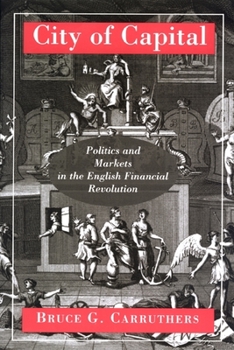City of Capital: Politics and Markets in the English Financial Revolution
Select Format
Select Condition 
Book Overview
While many have examined how economic interests motivate political action, Bruce Carruthers explores the reverse relationship by focusing on how political interests shape a market. He sets his inquiry... This description may be from another edition of this product.
Format:Paperback
Language:English
ISBN:0691049602
ISBN13:9780691049601
Release Date:November 1999
Publisher:Princeton University Press
Length:320 Pages
Weight:0.95 lbs.
Dimensions:0.7" x 7.8" x 10.0"
Customer Reviews
1 rating
How the paper really got shuffled
Published by Thriftbooks.com User , 15 years ago
Bruce Carruthers' "City of Capital," presented as a dissertation in sociology at the University of Chicago, nails down some home truths that academic economists and Wall Street financiers have often derided, to our cost, in recent times. Carruthers' research object was to determine whether in the time of Queen Anne, trading in London financial instruments was affected by non-economic factors and specifically party maneuvering. The short answer is, yes, sometimes, despite the economist Stanley Jevons's Law of Indifference which says that traders who allow anything but profits (and short-term profits at that) to affect their decisions will be squeezed out of the market. People as high up as Robert Rubin, Clinton's Treasury secretary, believed this. Carruthers does not prove that the Law of Indifference does not work in the long run, but he does show that even in unregulated markets, real-life traders behave as if it doesn't. A lot of scene-setting is required before getting to the rather brief research section, in which Carruthers manages to match traders in the big companies of the day (the Bank of England, the South Sea Company and the East India Company) with their party, social, religious and national associations. He examines the financial structures and government mobilization of resources in five 17th century states: England, France, Spain, the Netherlands and Sweden. A good deal of the book is devoted to establishing that government could co-opt (not a word he uses) rich people by borrowing money from them. This gave the creditor a stake in the continued health of the debtor. Carruthers uses the classical example of Eumenes, a Greek general surrounded by hostile Macedonians, who instead of trying to buy support, borrowed from everyone. Given that he is writing about the Augustan Age in England, the common remark of the time that tailors could not afford to turn down new business from deadbeat milords would have served as well and been more apposite. In any case, the scope for co-option was well understood at the time. It seems we have forgotten a lot. In any event, Carruthers is absolutely right that "more than just economic behavior takes place in a market," however much the financial big noises today would like to deny it. To take an obvious example, globalization aimed to driving all wage costs down to coolie levels -- whatever the merits of that -- have the additional effect of exporting not merely American jobs but American environmental policy overseas. If you are concerned about carbon dioxide levels (I am not but many people claim to be), then being able to buy consumer goods cheaply at Wal-Mart may come with a hidden price that the market is incapable of reacting to. In the reign of Queen Anne "public debt proved to be an impressively subtle instrument for the pursuit of partisan ends." It still is. But not in the way that the Reaganomics crowd would have us believe. Around 1700, the richest countries in the world, with th





